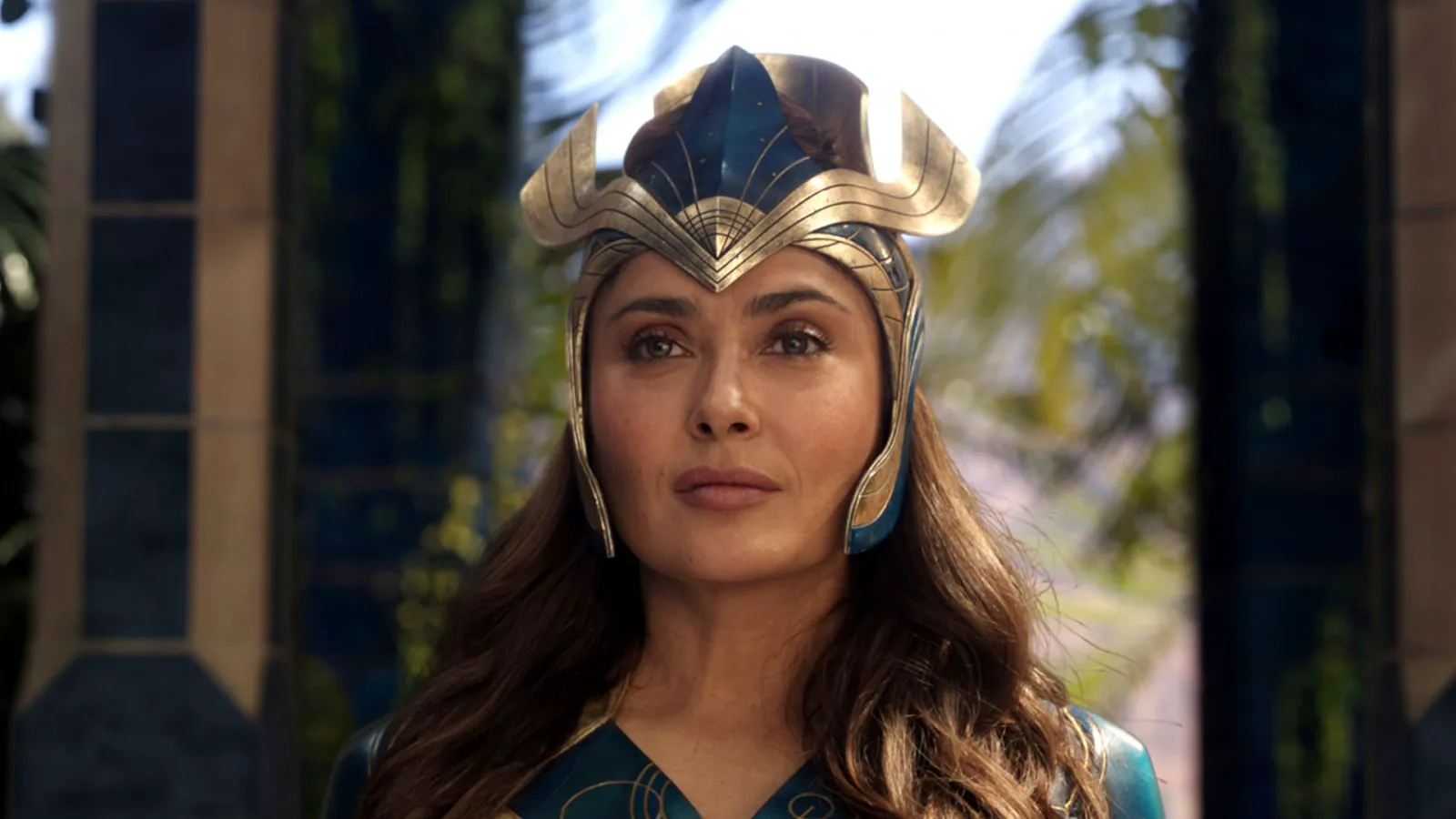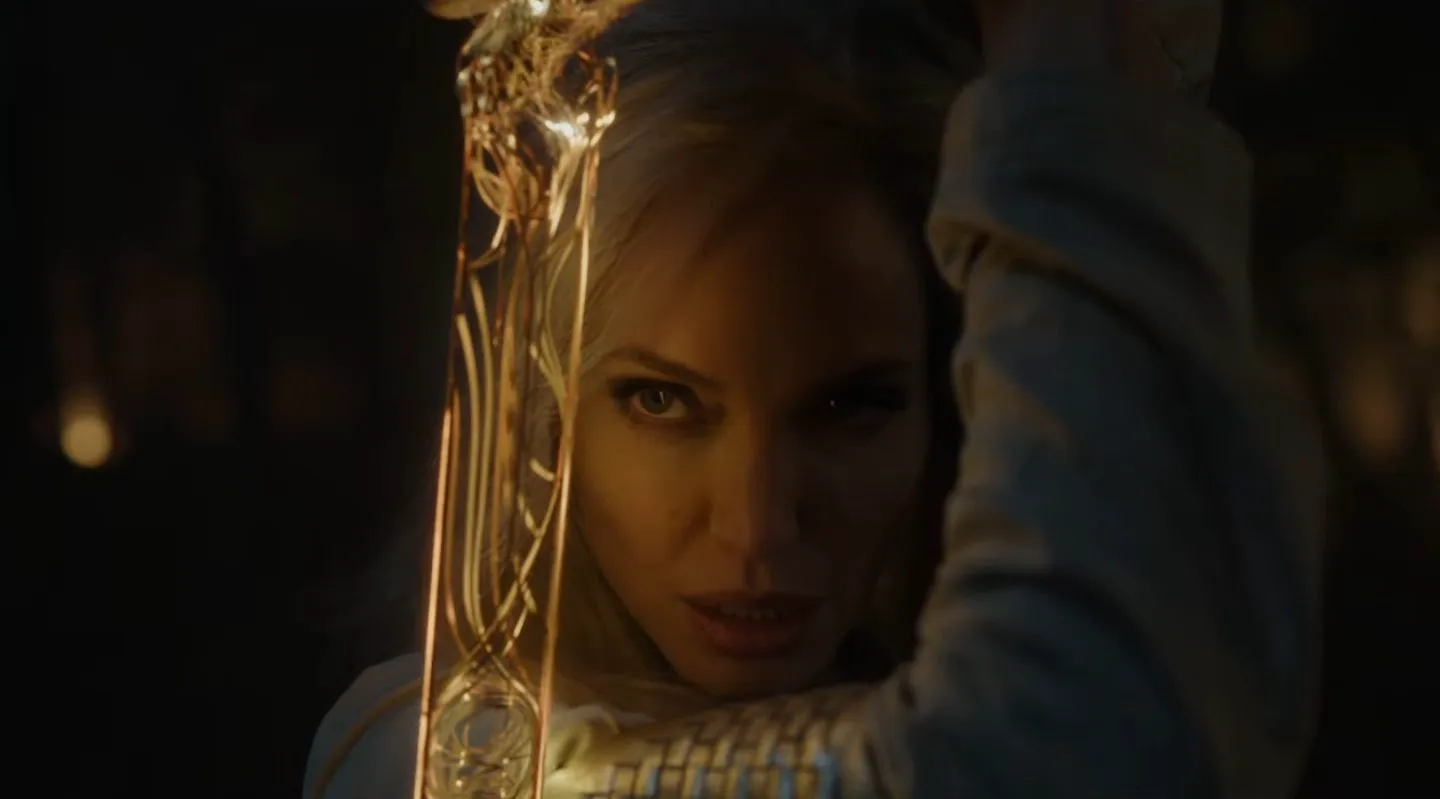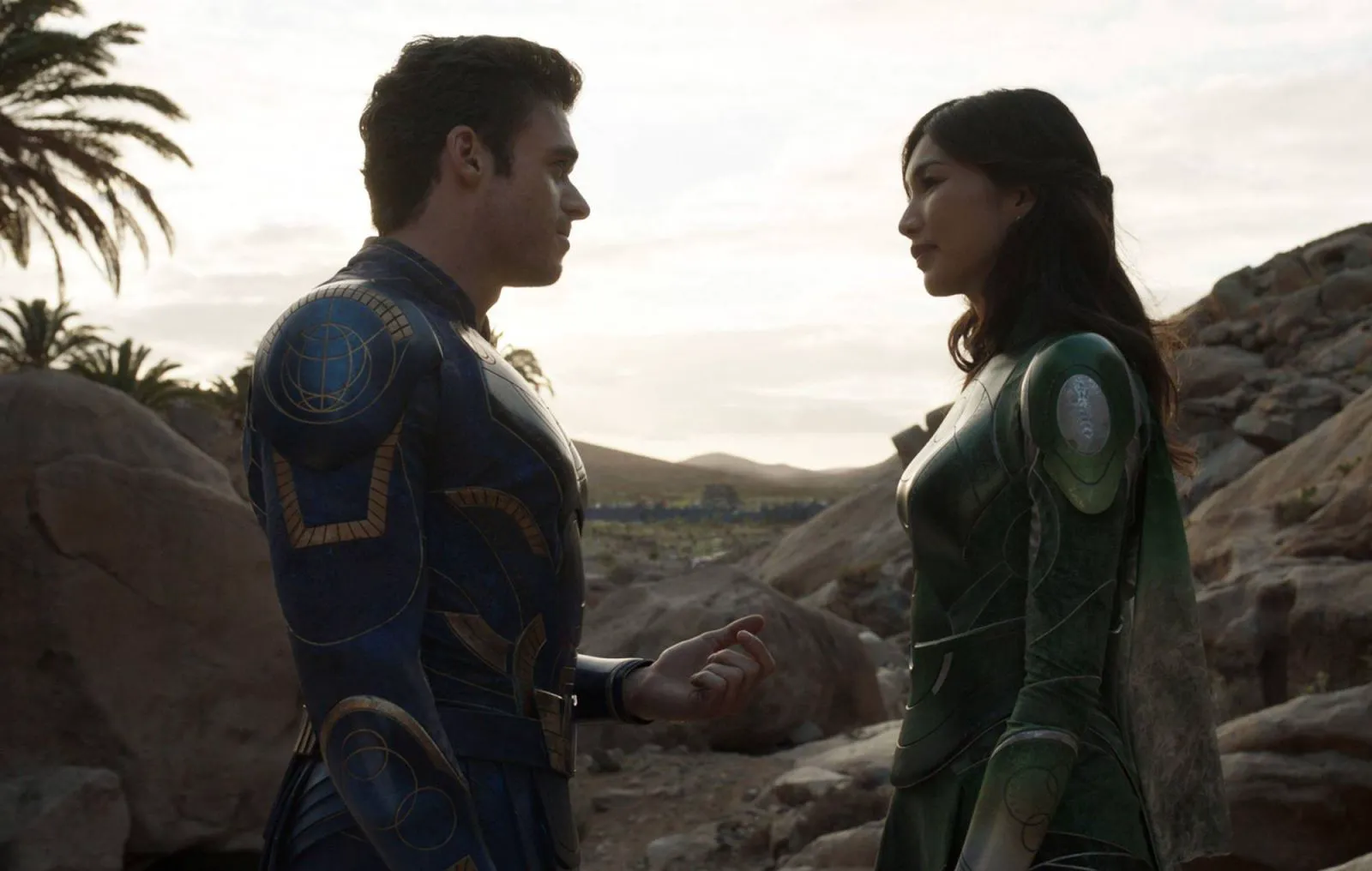Chloé Zhao’s “Eternals”: A Cosmic Saga of Humanity and Conflict
Oscar-winning Chloé Zhao (“Nomadland”) has directed the largest Marvel comic book movie in a long time—and the most controversial.
“Eternals” is a remarkable film within the Marvel universe. Firstly, it’s the biggest Marvel movie since “Avengers: Endgame” (and before, presumably, “Multiverse of Madness”). Secondly, it’s the first time an Oscar-winning director, Chloé Zhao, who won the golden statuette with “Nomadland,” has directed a film for the company. Thirdly, “Eternals” is currently the lowest-rated film in the MCU, even losing out to “Thor: The Dark World” in the rankings. The latter, considering other details, is particularly interesting: the film clearly aimed for the prestigious space of the “auteur blockbuster.” But along the way, the aim seems to have been knocked off, and Zhao became just one of the victims of the ruthless Marvel machine.

Salma Hayek as Ajak in “Eternals”
The Eternals’ Mission
Long ago, at the dawn of human civilization, the Eternals—ageless beings with superpowers—arrived on Earth. Commissioned by the Celestials, colossal cosmic beings who forge new suns from universal energy, they fought against the vile Deviants, thereby protecting humanity. However, they were forbidden from interfering in conflicts between humans, so the Eternals watched for millennia as entire peoples perished due to wars and as the technologies they brought became deadly weapons.
When all the Deviants were exterminated, the immortal aliens went to live among humans and waited for the Celestial Arishem to send them home. But for some reason, he never did. Sersi (Gemma Chan, who already appeared in the MCU as a minor villain in “Captain Marvel”) settled in London, where she teaches biology to children and has a romance with a regular guy, Dane (Kit Harington). In short, she tries to lead a normal life until a series of strange earthquakes suddenly sweep across the planet, and one of the seemingly extinct Deviants appears right in the middle of the British capital. Moreover, the monster somehow possesses the powers of Ajak (Salma Hayek), the leader of the Eternals. The immortal warriors decide to gather together and find out what is happening—soon it will turn out that their entire mission was a cover for something far more global and frightening.

Angelina Jolie as Thena in “Eternals”
A Grandiose Narrative
The attempt to explain even not the plot, but only the setup of “Eternals” stretched to two paragraphs for a reason—it’s a huge, two-and-a-half-hour film, unprecedented in terms of dramatic ambitions for the MCU (yes, “Endgame” was longer, but the main storyline there is still quite straightforward). If “Guardians of the Galaxy” once lifted the cinematic universe from Earth and sent it to conquer the stars, then Chloé Zhao’s film is a cosmogonic myth of this world, explaining how planets were born in it and who exactly pulled humanity out of the cradle of civilization. And at the same time, it’s a classic ensemble superhero movie, where you need to travel the world in search of all the members of the group and, ideally, also tell some kind of story between the heavy Mesopotamian flashbacks and extensive exposition.
It sounds, perhaps, like the most heavyweight movie in the world—but, surprisingly, “Eternals” doesn’t bend too much under this huge layer of information. Some foreign critics have compared the film to “Zack Snyder’s Justice League,” in the sense that it is also an epic blockbuster that doesn’t skimp on runtime for its characters. The coincidences are obvious: there are ancient myths, a jumble of chronotopes, and one of the Eternals, Ikaris (Richard Madden), can fly and shoot lasers from his eyes—he is even openly called “Superman” at one point (I wonder if Marvel’s lawyers asked for separate approval for this little gag). But still, Zhao’s film is more of an anti-“League.”
Snyder made “epic” cinema in the most direct, ancient sense—that is, one that is more interested in grandiose ideas and conflicts of truly cosmic proportions. Zhao’s focus is the opposite. In all this mythical madness, she is most interested in looking into faces, finding banal human weaknesses in immortal souls. All her characters are emphatically vulnerable and imperfect: Thena (Angelina Jolie) suffers from memories of past lives forgotten millions of years ago, which cause her to have bouts of uncontrolled aggression; Sprite (Lia McHugh) is an immortal child who feels adult passions but cannot realize them; Phastos (Brian Tyree Henry) became disillusioned with people because of how they used his inventions, but found solace in love; Druig (Barry Keoghan), who can control minds, became angry with the whole world and went to live in the Amazon jungle with a small community; Makkari (Lauren Ridloff) can run fast but cannot hear; and even the all-powerful Ikaris suffers from secrets he has to hide.

Richard Madden as Ikaris in “Eternals”
Zhao’s Signature Style
As in her Oscar-winning work, Zhao again studies a strange community of broken people (well, almost people) whose lives collapsed at one point, and the goal encoded in their DNA turned out to be a deception. The gold of the ripening fields from “Nomadland” may have turned into the golden magical runes of “Eternals,” but otherwise, the director’s signature style has remained more or less the same. She still likes to place characters in spacious pastoral landscapes and, in the spirit of Terrence Malick, focuses on fine motor skills, gentle glances, and rare touches. This is a story of gods who most want to become just people, and in this sense, the film fits perfectly into the overall Marvel worldview. Where banal humanity always triumphs over the grandiose universal plan, and higher interdimensional beings can be defeated by simple ingenuity, as Doctor Strange did.
The most interesting thing in “Eternals” is watching how Zhao builds the dynamics of relationships in the team, placing all-powerful superheroes at a simple IKEA dining table. Her film is very cozy, cute, and witty—but only, unfortunately, in those moments when it deviates from the main plot. Sooner or later, “Eternals” has to return to the familiar superhero rails, throw itself into battles with faceless enemies with the most boring design in the world, laugh at the jokes of the obligatory comic relief (this time, fortunately, really funny), and feignedly marvel at plot twists: oh, it turns out that the creature with the most villainous appearance in the world really turned out to be a villain. What a surprise.
A Clash of Visions
In its films, Marvel has long been trying to combine global meta-plots with simple human stories—that’s why they have been inviting indie directors for years, who may not be able to stage action, but are able to work with characters. And if this formula has worked more or less before, then something seems to have finally broken on “Eternals.” Perhaps Zhao’s vision simply turned out to be too strong to be easily adapted to the corporate template: in her film, the lyrical actively conflicts with the epic, big entertaining thoughts—with hackneyed genre tropes. “Eternals” is hardly the worst film in the cinematic universe (not even close), but it shows better than others that the studio needs to change something in its approach to comic book movies. As long as Marvel is reshooting the new “Doctor Strange” from Sam Raimi because it turned out too “scary,” nothing good will come of it, even if you invite two-time or five-time Oscar winners.